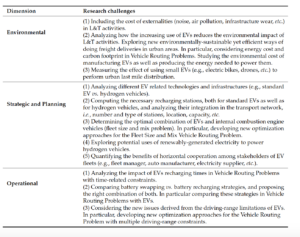Current logistics and transportation systems include heterogeneous fleets consisting of common internal combustion engine vehicles as well as other types of vehicles using “green” technologies, e.g., plug-in hybrid electric vehicles and electric vehicles (EVs).
However, the incorporation of EVs in logistics and transportation activities also raise some additional challenges from the strategic, planning, and operational perspectives. For instance, cities are required to provide recharge stations for electric-based vehicles, meaning that investment decisions need to be made about the number, location, and capacity of these stations. Similarly, the limited driving-range capabilities of EVs, which are restricted by the amount of electricity stored in their batteries, impose non-trivial additional constraints when designing efficient distribution routes.
A research paper identifies and reviews several open research challenges related to the introduction of EVs in logistics and transportation activities, including: environmental-related issues, and strategic, planning and operational issues associated with “standard” EVs and with hydrogen-based EVs.
This paper also analyzes how the introduction of EVs in logistics and transportation systems generates new variants of the well-known Vehicle Routing Problem, one of the most studied optimization problems in the logistics and transport field, and proposes the use of metaheuristics and simheuristics as the most efficient way to deal with these complex optimization problems.
Source:

